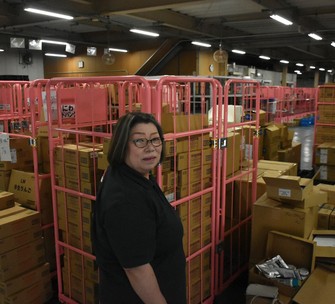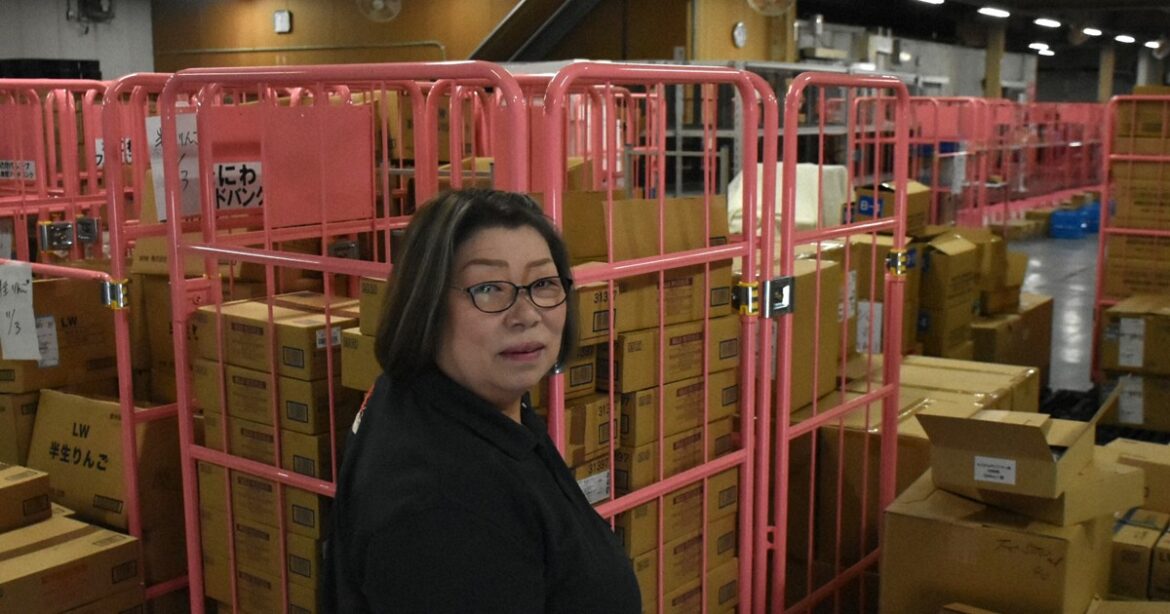
Kodomo no Ibasho Support Osaka’s executive director Hiromi Yokota is seen standing by boxes of food items donated by companies and others, in Osaka’s Nishinari Ward. Checking the expiration dates is an essential process. (Mainichi/Kentaro Nagaoka)
OSAKA — At the end of September, around 30 boxes of frozen “shumai” dumplings and croquettes were delivered to a general incorporated association’s warehouse. “We have to manage expiration dates properly. We absolutely cannot let food go to waste,” executive director Hiromi Yokota said as she closely watched the staff carefully check the expiration dates on each item and rewrite them clearly in large letters.
700 metric tons donated each year from 120 companies
Such food items are passed on to “children’s cafeterias” across Osaka Prefecture. Children’s cafeterias, located across Japan, provide free or low-priced meals to children, and their operators range from nonprofit organizations to individuals. As some struggle to secure all the food they need on their own, food banks like Kodomo no Ibasho Support Osaka serve as “intermediary food banks” to help support these efforts.
Kodomo no Ibasho Support Osaka, located in Osaka’s Nishinari Ward, was launched in April 2020 as part of a national initiative to use dormant funds. It supplies food to about 300 children’s cafeterias in 21 cities, two towns and one village across the prefecture.
Large quantities of donated food from companies and elsewhere are first brought on heavy trucks to Support Osaka’s warehouse, which is equipped with refrigeration and freezing units. The food is then matched with affiliated children’s cafeterias throughout the prefecture and distributed to each location through a total of nine hub centers.
Much of the donated food consists of items that would otherwise be discarded due to reasons such as product line changes. The system benefits both sides, allowing businesses to reduce disposal costs while contributing to society. Support Osaka has adopted a policy of “never turning away donations” and has built a system capable of handling bulk deliveries by companies. Today, around 120 firms including major food manufacturers and convenience store chains are involved, donating approximately 700 metric tons of food annually, such as vegetables, meat, noodles and frozen foods.
The organization was launched thanks to what executive director Yokota, 63, saw during her time in the PTA at her daughter’s elementary school. She came across a child who had no money to spend at a local festival and was standing alone, watching others enjoy the food stands. She also saw siblings share a single snack as their lunch, given to them by their mother. “I don’t want children to feel sadness or hunger,” Yokota reflected.
Support Osaka has provided all the food it receives from companies and others to children’s cafeterias free of charge. However, government subsidies have ended, and the organization is now facing financial uncertainty. They have covered various expenses, such as warehouse costs and salaries for their seven staff members, through means such as crowdfunding.
In May, Support Osaka began asking businesses for sponsorship deals starting at 50,000 yen (roughly $330) per unit. Even so, they have yet to secure stable funding. Yokota told the Mainichi Shimbun, “If children’s cafeterias are the main stage, we’re working behind the scenes. We would be grateful if more companies could get involved in the long term to help protect these cafeterias.”
In July, Yokota opened her own children’s cafeteria called Manpuku Gohan inside Support Osaka’s office. But she commented, “What I really hope for is a society where children’s cafeterias are unnecessary. The best thing would be for kids to enjoy warm meals in their own homes.”
There are now said to be more than 10,000 children’s cafeterias nationwide. Yokota stated, “As long as there are kids who need children’s cafeterias, we have to keep this work going no matter how difficult it gets. We can’t let it disappear.”
(Japanese original by Kentaro Nagaoka, Osaka City News Department)


AloJapan.com